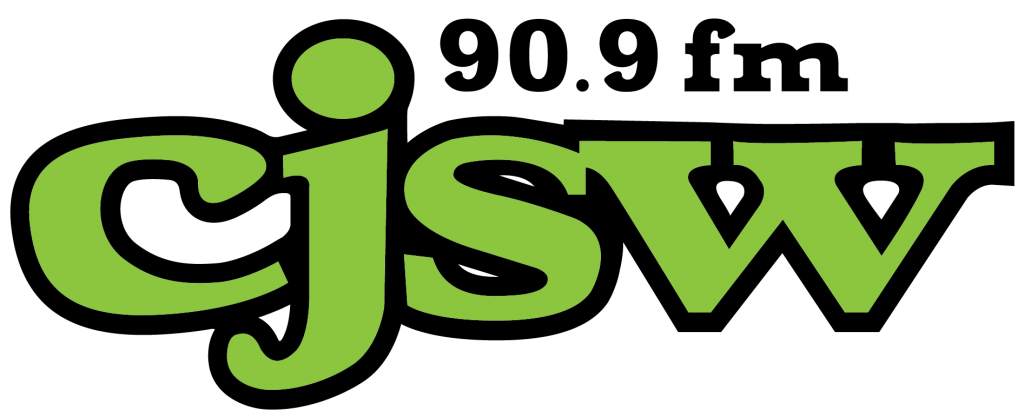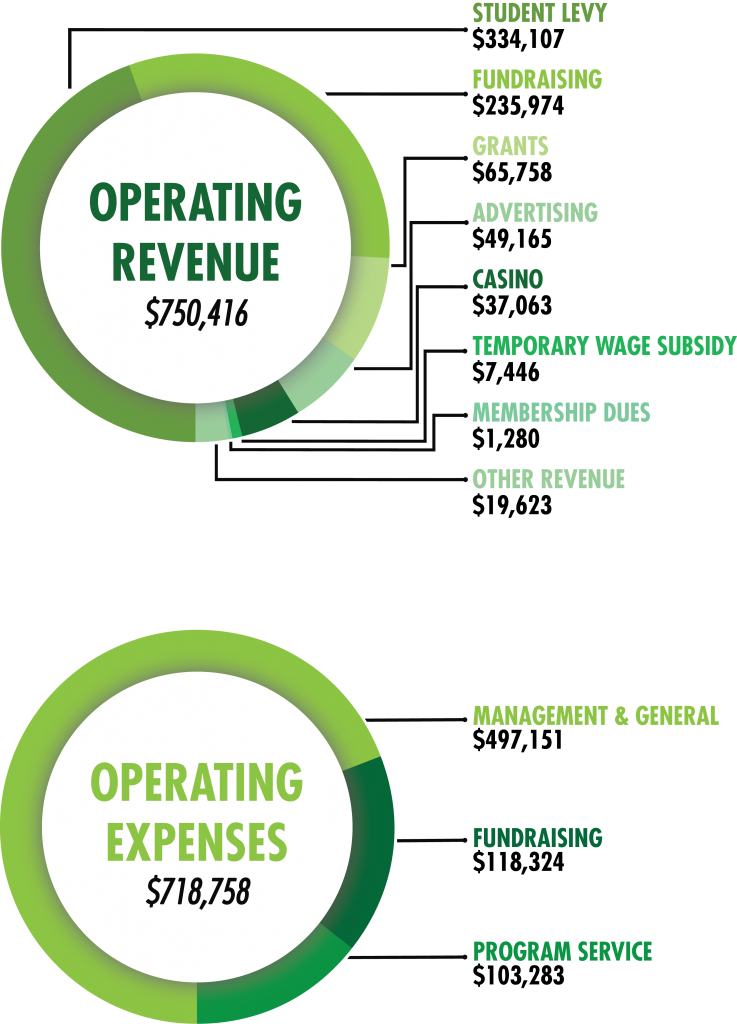
The University of Calgary Student Radio Society (CJSW Radio) is one of Calgary’s only independent media outlets and is Calgary’s only campus & community radio station. Based on campus at the University of Calgary located on Treaty 7 land, CJSW operates as a non-profit society with a small team of staff and a large dedicated volunteer base. We broadcast over 110 music, spoken word and multicultural programs in more than 10 languages on 90.9 FM, online at cjsw.com, and podcasted on iTunes, Spotify, and Google Play.
CJSW has a long and colourful history, going on air before the University of Calgary even existed. The station started as SAIT’s radio club and evolved to the University of Calgary’s campus station that broadcast only on campus inside the MacEwan Student Centre and as far away as the campus residence buildings. Now, we broadcast far and wide with a strong 18,000 watt FM signal, and online podcasting of all of our programs.
We take pride in bringing diverse and passionate voices from throughout Calgary and the surrounding areas to discuss topics that may not receive mainstream exposure elsewhere. We tell stories that you won’t hear anywhere else and work to strengthen relationships among the arts, business, intellectual, and cultural communities and the audiences they are looking to reach.
Through our broadcast, we increase the profile of local, Canadian, and independent artists, groups and organizations. We do this is by playing their music, telling their stories, hosting them on our programs, and promoting their causes and events. Our hosts play a vast array of genres from rock, blues, folk, jazz, experimental, metal, hip-hop, soul, electronic, classical, and world music.
MISSION
We at CJSW are a not-for-profit, volunteer-powered organization where University of Calgary students, campus and community stakeholders come together to create, collaborate, communicate and make great radio content. Our programming mandate is to engage with and provide a platform for celebrating the diverse voices in our region.
VISION
CJSW are leaders in providing a dynamic and progressive hub for members of the University of Calgary campus, as well as the citizens of Calgary, and the surrounding area. Our goal is to facilitate the generation of original programming that reflects the uniqueness, interests, voices and values of our local campus and community stakeholders. We are committed to providing University of Calgary students and campus members with access to a wide range of educational, technical and artistic opportunities within our organization.
VALUES
CJSW fosters a safe and inclusive environment that prioritizes an organizational culture where all groups and individuals are treated with equality and respect. We hold ourselves accountable through fairness and accuracy in our reporting and representation, and as defined by our relationship with UC Students’ Union, our societal by-laws, our broadcasting licensing requirements, and government obligations. CJSW personnel and other representatives shall conduct themselves in accordance with our societal articles of governance and our core values of inclusivity, mutual respect and equality.
Community Standards
CJSW 90.9 FM strives to create a space to work, volunteer, and learn in which respect, civility, diversity, opportunity, and inclusion are valued and upheld. We are committed to the creation and preservation of a safe and inclusive space for everyone, so we may work towards the goals set out in our mandate.
We are proud to be Calgary’s campus and community broadcasters and value the dialogue we have with our listeners. At the same time, we recognize that bullying and harassment, sexual harassment, and all forms of sexual and gender-based violence are harmful to our members, to our staff and volunteers, and to our community. Therefore abusive behaviour, in any form, directed at our staff or volunteers from listeners and/or members of the general public will not be tolerated by CJSW.
Abusive behaviour includes, but is not limited to:
- name calling or insults;
- gossiping or spreading rumours or misinformation;
- using offensive language or terms;
- threats or intimidation;
- cyberbullying (such as posting or sending rude, offensive, humiliating, or intimidating messages or
- content through social media or email);
- harassing phone calls, texts, or direct messages;
- making unwelcome invitations or requests of a personal nature;
- making remarks, jokes, innuendo, slights, indignities, put-downs, insults, or taunts related to anyone’s race, religious beliefs, colour, sex, gender identity, gender expression, physical ability, mental ability, age, ancestry, place of origin, marital status, source of income, family status, or sexual orientation; and
- any action that undermines the welfare and/or safety of our staff or volunteers.
Consequences of Abuse
We take any reports of abuse seriously. If we receive credible information about an individual engaging in abusive behaviour towards our staff or volunteers, appropriate action will be taken. This may include, but is not limited to:
- issuance of warnings from CJSW staff;
- suspension or termination of the ability to engage with CJSW’s caller phone line/text-to-booth systems and social media pages;
- prohibition of volunteering or otherwise engaging directly with CJSW; and
- forwarding incidents of abusive behavior to the Calgary Police Service or any other relevant law enforcement.
Reporting
If you witness or experience any form of abuse directed at our staff or volunteers, please report it immediately to CJSW station management. We encourage open communication, and your concerns will be treated with confidentiality and addressed promptly. Please reach out to:
Adam Kamis – Station Manager: [email protected] / 403.220.3904
Emily Donville – Program Director: [email protected] / 403.220.3903
CJSW Harassment and Violence Prevention Policy
Guiding Principle
CJSW 90.9 FM strives to create a space to work, volunteer, and learn in which respect, civility, diversity, opportunity, and inclusion are valued and upheld. We are committed to the creation and preservation of a safe and inclusive space for everyone, so we may work towards the goals set out in our mandate. Bullying and harassment, sexual harassment, and all forms of sexual and gender-based violence are harmful to our members and community, and therefore will not be tolerated by CJSW.
Purpose of this policy
This policy is designed to provide a framework for the safety and care of CJSW members who have experienced any form of harassment or violence during their involvement with the station.
We understand the importance of placing these individuals at the centre of our response process and taking their lead throughout the duration of the process. Among the options available to support them include the subsequently outlined steps for informal disclosure, formal reporting and investigation, and the procedure for handling a report.
To whom and when does this policy apply
This policy applies to all members of the CJSW community, including but not limited to staff, student executive, board members, volunteers, listeners, and visitors to the station. It applies to incidents that take place on CJSW property, while any member is acting within their CJSW role, or to incidents that take place off CJSW property where the parties are engaged in activities related to their role(s), including at public events and on social media or in other online spaces.
While CJSW listeners cannot be held accountable to this policy, CJSW is committed to ensuring that our programmers can work in a safe environment, and so listeners will be held to the standards outlined in this policy when interacting with programmers on the air, at the station, or in public.
Behaviour which occurs separate from any CJSW-related activities and which is unrelated to an individual’s role with CJSW is not covered by this policy.
Definitions
Harassment or Bullying
Harassment or bullying means any inappropriate or unwanted behaviour by one individual towards another person. This can take the form of hostile or unwanted conduct, verbal comments, actions, or gestures which would negatively impact the dignity or psychological or physical integrity of an individual and result in a harmful environment for such an individual. An intent to harass or bully need not be present for the behaviour to be considered harassment or bullying.
Harassing or bullying behavior can include, but is not limited to:
- name calling or insults;
- gossiping or spreading rumours or misinformation;
- deliberately misgendering (such as referring to a person using terms or pronouns that do not align with the person’s affirmed gender);
- using offensive language or terms;
- yelling or screaming;
- pestering, spying, or stalking;
- tampering with personal belongings and equipment;
- exclusion or isolation of individuals;
- intimidation (such as standing too close or making inappropriate gestures or comments);
- physically abusing or threatening physical abuse;
- cyberbullying (such as posting or sending offensive, humiliating, or intimidating messages or content through social media or email);
- harassing phone calls, texts, or direct messages;
- deliberately setting the individual up to fail (such as making unreasonable demands, setting impossible deadlines, or interfering with work);
- intentionally withholding information or giving the wrong information;
- taking away work or responsibility without cause;
- disciplining or threatening job loss without a valid reason;
- displaying or distributing sexist, racist, homophobic, transphobic, ableist or otherwise offensive or discriminatory objects, pictures, posters, memes, cartoons, letters, or emails in print or electronic form;
- making unwelcome invitations or requests of a personal nature; and
- making remarks, jokes, innuendo, slights, indignities, put-downs, insults, or taunts (including microaggressions) related to anyone’s race, religious beliefs, colour, sex, gender identity, gender expression, physical ability, mental ability, age, ancestry, place of origin, marital status, source of income, family status, or sexual orientation – most of these categories are also protected under the Alberta Human Rights Act.
Reasonable actions taken by a supervisor while managing and directing employees or volunteers (such as enforcing workplace policies and procedures, evaluating or measuring performance, and appropriately providing constructive feedback) are not considered harassment or bullying.
Sexual Harassment
Sexual harassment is any inappropriate or unwanted comment or conduct of a sexual nature, including comments about sex, gender identity, gender expression, or sexual orientation. An intent to sexually harass need not be present for the behaviour to be considered sexual harassment.
Sexual harassment includes, but is not limited to:
- making unwelcome sexual advances, propositions, flirtations or unwelcome requests for or efforts to make social contact, including asking questions about sexual conduct or sexual orientation or engaging in rumours or gossip about such information;
- after an initial rejection, making repeated invitations of a romantic nature;
- making or threatening reprisals after a negative response to sexual advances;
- demands for sexual favours;
- making comments about an individual’s body, sexual experience, sexual orientation or sexual deficiencies or using sexually degrading or vulgar words to describe an individual or making derogatory sexual comments;
- displaying or distributing pornographic, sexually suggestive or gender-based objects, pictures, posters, memes, cartoons, letters, or emails in print or electronic form;
- touching a person’s body without consent, including massages or hugging;
- leering at a person’s body;
- placing a condition of a sexual nature on employment or volunteering (including any opportunity for training or promotion), or on the provision of services;
- unwelcome innuendos, remarks, or joking about a person’s gender, gender identity or expression, sex (including pregnancy and breastfeeding) or sexual orientation;
- threats of a sexual nature; and
- any other unwanted verbal or physical conduct of a sexual nature.
Sexual and Gender-Based Violence
Sexual and gender-based violence means any violence, physical or psychological, that is committed, threatened, or attempted against a person without the person’s consent through a sexual means or by targeting sex, gender identity, gender expression, or sexual orientation. Consent must be explicit, ongoing, and voluntary. It cannot be assumed just because a person does not object to a specific behavior or communication, nor can it be assumed because it was given previously. Consent can be revoked at any time.
Sexual and gender-based violence can be a single incident or a pattern of behaviour. It can occur in person, online, or via other means. Sexual and gender-based violence is a spectrum of behaviours and can include, but is not limited to:
- sexual assault (which itself is a range of behaviours from unwanted touching to oral sex or penetration with any object or body part);
- sexual harassment (see definition above);
- sexual activity with an individual who is incapacitated (for example, by drug or alcohol use, unconsciousness, or as a result of disability);
- indecent exposure;
- voyeurism; and
- acquisition or distribution of sexual images or video of an individual without their consent.
CJSW recognizes that sexual and gender-based violence is not experienced by everyone in the same way. Sexual and gender-based violence is rooted in systemic oppression, including colonialism, racism, sexism, homophobia, transphobia, and ableism. As such, each case must be assessed for differential impacts based on, among other things, sexual orientation, gender identity, gender expression, indigeneity, race/ethnicity, religion, disability, or age.
What to do if you are being harassed, bullied, or are a victim of sexual or gender-based violence
CJSW recognizes that conflicts, disagreements, or inappropriate behaviours will occur. When possible, we expect these issues to be resolved in a manner that contributes to a healthy and productive workplace. You have the right to tell someone that their behaviour is unwelcome and ask them to stop.
However, if you feel that you feel unable to handle a situation on your own, you can either make an informal disclosure or a formal complaint.
Informal disclosures can be made to CJSW’s Station Manager or Volunteer Coordinator. If you do not feel comfortable with approaching either of these staff members, you may approach another staff member, or member of CJSW’s board of directors.
In the informal disclosure process, the staff or board of directors’ member who receives the disclosure will not make any written report. The staff or board of directors’ member will work with the disclosing individual to determine what supports they would like and help them to access outside support if necessary.
Where an informal disclosure is made, no investigation of the complaint will be undertaken by CJSW. If you choose to make a formal complaint, this will trigger an investigation.
Formal complaints should be made, either in writing or verbally, to the Station Manager or the Volunteer Coordinator. If you do not feel comfortable with approaching either of these staff members, you may approach another staff member, or member of CJSW’s board of directors.
You will be asked to provide, if possible, dates, times/frequency, locations, names of those involved or possible witnesses, what happened, your response, and any supporting documents (such as emails, texts, or social media posts or messages). You do not have to have all this information to make a formal complaint, but this information can strengthen your case and help you remember more details over time.
You may make a formal complaint anonymously. However, this may limit the ability of CJSW to investigate and respond.
You are under no obligation to make a formal complaint. There is no time limit for making a formal complaint, although we would encourage you to make a formal complaint as soon as you feel able to as an investigation is more challenging the longer the period of time between incidents and complaints. You have the right to withdraw your formal complaint at any time. However, CJSW may still choose to act on your complaint in order to comply with this policy or its legal obligations.
CJSW recognizes that victims of sexual and gender-based violence, harassment, or bullying may be reluctant to come forward if they have violated other organizational policies or rules (for example, consuming alcohol or cannabis while at work). As such, CJSW will not subject anyone who reports or discloses sexual or gender-based violence, harassment, or bullying to disciplinary action for behaviours that occurred at the time of the incident.
The formal complaint process is not intended to discourage you from exercising your rights pursuant to any other law or resource, including making a complaint with the Alberta Human Rights Commission, reporting any incident of violence to the police, civil litigation or, if you’re a University of Calgary student, accessing the university’s Sexual Violence Support Advocate.
Confidentiality
The Occupational Health and Safety Code, article 390.5(c), prohibits CJSW from disclosing the circumstances related to an incident, the names of the parties involved (including the complainant, the accused, and any witnesses), or the outcome of an investigation except where necessary:
- To investigate the incident or to take corrective action,
- To inform the parties involved in the incident of the results of the investigation and corrective action taken, or
- As required by law.
Due to this legal restriction, CJSW members, volunteers, listeners, and the general public are never entitled to information about internal harassment complaints or investigations. CJSW employees may be informed of the results of a harassment investigation where their cooperation in implementing corrective action requires it. The decision to share information rests with the board of directors and the Station Manager. All parties who are made privy to the results of an investigation are subject to the confidentiality requirements outlined above.
Support
Supports are available to any member of the CJSW community who has been a victim of harassment, bullying, sexual harassment, or sexual or gender-based violence, regardless of whether or not you choose to make a formal complaint. These include referral to the CJSW’s Employee Assistance Program and specific workplace accommodations as required. However, these supports will not circumvent or undermine due process, the principles of natural justice, or the investigation procedure outlined in this policy. You should also feel free to consult a health care professional of your choice for treatment or referral to further supports.
Investigation Process
An investigation will be initiated within 30 days, and completed within 90 days, of receiving the formal complaint. The investigation process follows principles of natural justice and will appropriately protect the rights of both the individual making the complaint and the accused.
Unless the complaint involves the Station Manager, they and a member of CJSW’s board of directors will investigate the complaint. If the Station Manager cannot be involved in the investigation, it will be conducted by a member of the board of directors and a member of CJSW’s full-time staff, selected by the board.
As part of the investigation, you, the accused, and any individuals who may be able to provide relevant information related to your allegations will be interviewed. All parties will be invited to submit any relevant documents to the investigation team at that time.
In conducting any investigation, the investigation team will not inquire about nor consider the sexual history or reputation of either the individual making the complaint or the accused.
Upon conclusion of the investigation, the investigation team will produce a report of their findings including, if necessary, recommendations for disciplinary actions. This report will be submitted to the board of directors, who will decide what corrective actions to take. If the investigation reveals evidence to support the complaint, discipline may include mandatory education, suspension, or dismissal. All decisions by the board of directors regarding disciplinary action are final and not subject to appeal. Should a volunteer or employee be dismissed as a result of an investigation, they will never be eligible to volunteer or work at CJSW again in the future.
Regardless of the outcome of a complaint made in good faith, the employee lodging the complaint as well as anyone providing information will be protected from any form of retaliation by either co-workers or superiors. This includes dismissal, demotion, unwanted transfer, denial of opportunities within the company, or harassment for having made a complaint or having provided evidence regarding the complaint.
Responsibility of CJSW Staff
It is the responsibility of all CJSW staff to take immediate and appropriate action to report or deal with incidents of harassment or violence of any type, whether brought to their attention or personally observed. Under no circumstances should a complaint be dismissed or downplayed, nor should the complainant be told to deal with it personally.
The Station Manager is also responsible for ensuring that all employees and volunteers are aware of this policy, have easy access to the policy, and that they all participate in mandatory awareness and educational programs to address the prevention of harassment, bullying, sexual harassment, and sexual and gender-based violence, as scheduled from time to time. All CJSW employees will receive first responder to sexual assault and abuse training so that they can confidently respond to disclosures.
All staff and volunteers will be required to annually sign an acknowledgement that they have read and understood this policy.
This policy will be reviewed and updated by the end of December each year by the HR committee of CJSW’s board of directors.
CJSW Radio broadcasts out of Moh’kins’tsis (Calgary, AB) at the University of Calgary campus radio station located on Treaty 7 land. CJSW would like to acknowledge the traditional territories of the people of the Treaty 7 region in Southern Alberta, which includes the Blackfoot Confederacy (comprised of the Siksika, Piikani, and Kainai First Nations), the Tsuut’ina First Nation, and the Stoney Nakoda (including the Chiniki, Bearspaw, and Goodstoney First Nations). The City of Calgary is also home to Métis Nation of Alberta, Districts 5 and 6. CJSW would also like to note that the University of Calgary is situated on land adjacent to where the Bow River meets the Elbow River, and that the traditional Blackfoot name of this place is “Moh’kins’tsis”, which we now call the City of Calgary.





